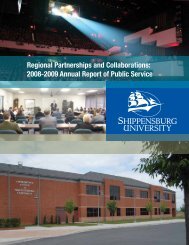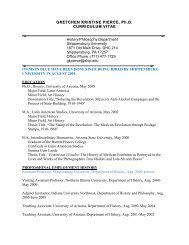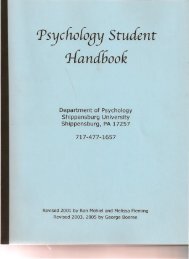2007-2008 Annual Report of Service - Shippensburg University
2007-2008 Annual Report of Service - Shippensburg University
2007-2008 Annual Report of Service - Shippensburg University
You also want an ePaper? Increase the reach of your titles
YUMPU automatically turns print PDFs into web optimized ePapers that Google loves.
Institute for Public <strong>Service</strong> 35<br />
Secure Detention Monitoring<br />
In April 1996, the consent decree settlement<br />
<strong>of</strong> the Coleman v. Stanziani federal class<br />
action suit expired. In keeping with the best<br />
practice philosophy consistent throughout<br />
the state juvenile justice system, the Juvenile<br />
Court Judges’ Commission voted unanimously<br />
to adopt the Coleman Standards from<br />
the expired consent decree as the only approved<br />
standards for secure detention use in<br />
the state. This was endorsed by the members<br />
<strong>of</strong> the Pennsylvania Council <strong>of</strong> Chief Juvenile<br />
Probation Officers and the Juvenile Detention<br />
Centers Association <strong>of</strong> Pennsylvania. In monitoring<br />
the standards governing secure detention,<br />
the Center for Juvenile Justice Training<br />
and Research performs a pre-audit and an onsite<br />
audit each year on the state’s twenty-two<br />
detention centers. In <strong>2007</strong>, 18,967 detention<br />
admissions were reviewed for compliance.<br />
In addition, the detention monitor provides<br />
training and technical support on a<br />
routine basis to county juvenile probation<br />
departments, probation staff, and detention<br />
administrators throughout the state <strong>of</strong><br />
Pennsylvania.<br />
Federal Juvenile Justice<br />
Compliance Monitoring Project<br />
Since 1987, the center has participated<br />
on the Compliance Monitoring Advisory<br />
Committee established by the Pennsylvania<br />
Commission on Crime and Delinquency<br />
(PCCD). This committee designed and implemented<br />
a system to monitor statewide compliance<br />
with the mandates <strong>of</strong> the federal Juvenile<br />
Justice and Delinquency Prevention Act <strong>of</strong><br />
1974; specifically, the de-institutionalization<br />
<strong>of</strong> status and non-<strong>of</strong>fenders, the separation <strong>of</strong><br />
juvenile and adult <strong>of</strong>fenders, and the removal<br />
<strong>of</strong> juvenile <strong>of</strong>fenders from adult jails and police<br />
lockups. The monitoring system includes<br />
on-site visits to detention centers and annual<br />
admission audits <strong>of</strong> all secure juvenile detention<br />
centers, as well as ongoing technical assistance<br />
to those in the monitoring universe. In<br />
July 1996, the Pennsylvania Commission on<br />
Crime and Delinquency became the sole state<br />
agency to provide a grant award to continue<br />
the Secure Detention Monitoring Project.<br />
The information collected in this effort<br />
assists the PCCD to determine future funding<br />
priorities. This information is also included in<br />
the annual compliance monitoring report submitted<br />
to the federal Office <strong>of</strong> Juvenile Justice<br />
and Delinquency Prevention.<br />
Information Technology<br />
The Information Technology Division<br />
is responsible for the collection, analysis, and<br />
publication <strong>of</strong> juvenile court dispositional data.<br />
Approximately 100,000 records concerning juvenile<br />
court dispositions are processed annually<br />
by the center. The 2006 report, “Pennsylvania<br />
Juvenile Court Dispositions,” was distributed<br />
to the governor’s <strong>of</strong>fice, juvenile court judges,<br />
juvenile probation departments, legislative<br />
committees, and other public and private<br />
agencies. This report is available for download<br />
at www.jcjc.state.pa.us.<br />
The center continued to assist county<br />
juvenile probation departments in the development<br />
<strong>of</strong> computer automation projects.<br />
There are currently sixty-two counties using<br />
the s<strong>of</strong>tware for the automation <strong>of</strong> juvenile<br />
case management. The center participated<br />
with the chief juvenile probation <strong>of</strong>ficer <strong>of</strong><br />
these counties to enhance this s<strong>of</strong>tware. When<br />
completed, the case management s<strong>of</strong>tware will<br />
connect with a statewide Juvenile Tracking<br />
System ( JTS), which the center is involved<br />
in developing. The JTS is an application operating<br />
under the Commonwealth’s Criminal<br />
Justice Network project ( JNET), from which<br />
juvenile court dispositions will be reported<br />
for inclusion in the Pennsylvania State Police<br />
Central Repository in the coming year. JNET<br />
connects Criminal Justice Agencies <strong>of</strong> the<br />
Commonwealth, including juvenile probation,<br />
police, etc., allowing them to share and query<br />
appropriate real-time <strong>of</strong>fender information.<br />
In <strong>2007</strong>-08, the center processed 1,180<br />
Pennsylvania State Police (PSP) background<br />
checks related to firearm purchases, and 4,671<br />
background checks for employment purposes.<br />
In addition, a total <strong>of</strong> 2,048 expungement orders<br />
were processed.<br />
Communities That Care<br />
Technical Assistance & Training<br />
The Center for Juvenile Justice Training<br />
and Research (CJJT&R) has completed<br />
its twelfth year as provider <strong>of</strong> training and<br />
technical assistance for Communities that<br />
Care (CTC) in Pennsylvania. Through a cooperative<br />
agreement with the Pennsylvania<br />
Commission on Crime and Delinquency<br />
(PCCD) and the Juvenile Court Judges’<br />
Commission ( JCJC), CJJT&R has provided<br />
consultation services to over 100 communities<br />
throughout the Commonwealth to assist in<br />
addressing adolescent violence, delinquency,<br />
substance abuse, school drop-out and teen<br />
pregnancy, from a prevention and community<br />
intervention model.<br />
Three Regional Strategic Consultants<br />
(RSC’s), a contractual RSC serving Northwest<br />
Pennsylvania, a project director and an administrative<br />
staff member provide training and<br />
technical assistance to approximately ninetyseven<br />
communities throughout Pennsylvania.<br />
In addition to CTC specific trainings, support<br />
and instruction are available in the areas <strong>of</strong> process<br />
and financial sustainability, process fidelity,<br />
community board and staff development,<br />
program evaluation, social marketing strategies,<br />
fundraising return on investment, and the<br />
selection <strong>of</strong> Evidence-Based Programs.<br />
In an effort to provide personalized and<br />
expeditious technical assistance, the CJJT&R<br />
has divided the state into five regions. Each<br />
region functions independently <strong>of</strong> the others<br />
as does each community within the region;<br />
however, centrally located quarterly regional<br />
events allowing for large scale networking and<br />
training are held. On an annual basis, a plan is<br />
submitted to the CJJT&R CTC staff delineating<br />
how the funds will be spent during the<br />
coming year.<br />
CJJT&R staff has continued to work<br />
closely with the staff from the Penn State<br />
<strong>University</strong> Prevention Research Center to assist<br />
in the administration and dissemination <strong>of</strong><br />
web-based survey results from the community<br />
sites. The Prevention Center began conducting<br />
the web-based survey annually during fiscal<br />
year 2002-2003. The survey functions as a<br />
site’s self-assessment tool for use in prioritization<br />
<strong>of</strong> needs. Each board that elects to participate<br />
in the survey also has the opportunity to<br />
receive its results in an on-site presentation by<br />
its RSC. The RSC’s use the web-based survey<br />
results as a means <strong>of</strong> “personalizing” services<br />
they will provide to communities they serve<br />
over the grant year.<br />
Juvenile Justice Enhancement<br />
Training Initiative<br />
Since 2002, the center has played an<br />
integral role in advancing the principles and<br />
goals <strong>of</strong> balanced and restorative juvenile justice<br />
through the management <strong>of</strong> the Juvenile<br />
Justice Enhancement Training Initiative, a<br />
PCCD grant funded project that supports the<br />
statewide implementation efforts <strong>of</strong> the stakeholders<br />
<strong>of</strong> Pennsylvania’s juvenile justice system.<br />
The statewide balanced and restorative<br />
justice specialist manages the initiative from<br />
the center.<br />
The project positions the center as a focal<br />
point for the provision <strong>of</strong> educational<br />
materials, training and technical assistance,<br />
and support to juvenile justice practitioners<br />
throughout the Commonwealth in their efforts<br />
to advance these principles. The center’s<br />
Balanced and Restorative Justice Specialist<br />
provides technical assistance and training to<br />
county juvenile probation department staff,<br />
and is involved in a variety <strong>of</strong> local, state and<br />
national level committees and groups working<br />
towards system reform.<br />
In the past year, the project supported<br />
the development and publication <strong>of</strong> numer-

















